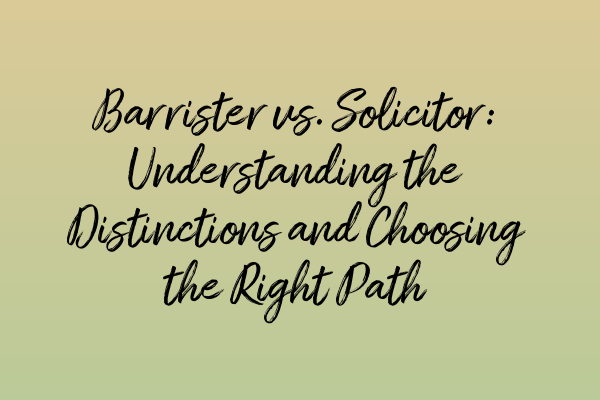Barrister vs. Solicitor: Understanding the Distinctions and Choosing the Right Path
In the legal profession, the roles of barristers and solicitors play significant roles in providing legal services to clients. While both professions are paramount to the functioning of the legal system, it’s essential to understand the distinctions between the two and how they can impact your legal career. Whether you’re a law student, considering a career change, or simply curious about the legal profession, this article will delve into the differences between barristers and solicitors, helping you make an informed decision about your career path.
Before we dive into the distinctions, it’s necessary to provide some context. In countries such as England and Wales, the legal system operates under a system commonly referred to as the “split profession.” Under this system, barristers and solicitors fulfill separate roles in the legal process, each with its own unique set of responsibilities and functions.
Barristers, often referred to as “advocates,” are specialist advocates who provide expert legal advice and represent clients in court. Their primary focus is on litigation, which involves arguing cases in court, presenting legal arguments, cross-examining witnesses, and preparing legal documents. Barristers have deep expertise in specific areas of the law and are sought after for their courtroom advocacy skills.
On the other hand, solicitors are legal professionals who handle a wide array of legal matters on behalf of their clients. They have direct contact with clients, providing legal advice, drafting legal documents, negotiating settlements, and managing legal transactions. Solicitors are often the first point of contact for individuals seeking legal assistance and can provide comprehensive legal services, including non-contentious matters.
Now that we have a general understanding of the roles of barristers and solicitors, let’s explore the key distinctions between the two:
1. Education and Training:
Becoming a barrister requires completion of a law degree, followed by completing the Bar Professional Training Course (BPTC), which is a postgraduate qualification. Once the BPTC is completed, aspiring barristers must secure pupillage (a form of apprenticeship) at a barristers’ chambers to gain practical experience in different areas of law.
For solicitors, the educational and training path involves completing a law degree, followed by the Legal Practice Course (LPC), which focuses on the practical skills necessary for day-to-day legal practice. Following the LPC, aspiring solicitors must secure a training contract with a law firm or other recognized legal organization, during which they gain firsthand experience in various areas of law.
2. Practice Areas:
Barristers typically specialize in advocacy and litigation, focusing on courtroom representation. They often work on complex, high-profile cases and are engaged by solicitors or directly by clients.
Solicitors, on the other hand, handle a wide range of legal matters, both contentious and non-contentious. Their areas of practice can include family law, criminal law, corporate law, real estate, employment law, and much more. They work directly with clients, providing legal advice, drafting contracts, and negotiating settlements.
3. Audience and Mode of Work:
In terms of audience, barristers predominantly interact with solicitors, who instruct them to represent clients in court. Their work mainly involves preparing and presenting legal arguments, cross-examining witnesses, and providing expert advice on legal issues.
Solicitors, on the other hand, have direct client contact and work closely with them throughout the legal process. They handle legal transactions, negotiate settlements, and provide ongoing legal advice and support. Solicitors are crucial in building and maintaining client relationships, as they are often the point of contact for all legal matters.
In conclusion, both barristers and solicitors play integral roles in the legal profession, albeit with different areas of focus and responsibilities. Barristers excel in advocacy and litigation, representing clients in court and providing specialized legal advice, while solicitors handle a broad range of legal matters, providing comprehensive legal services to clients.
Ultimately, the choice between becoming a barrister or a solicitor depends on your interests, strengths, and career goals. Consider your passion for courtroom advocacy, your penchant for research and legal analysis, and your preferred mode of client interaction. It is essential to carefully weigh these factors to choose the right path for your legal career journey.
Whether you choose to pursue a career as a barrister or a solicitor, the legal profession offers an exciting and rewarding path. As you embark on your journey, remember to seek guidance from experienced professionals, network with legal experts, and stay up-to-date with legal developments to excel in your chosen field.
For more information and resources related to legal education and practice, check out the following articles:
1. SQE Prep Made Easy: Strategies and Resources
2. SQE Prep: Tips and Tricks to Excel in Criminal Law
3. Terrorism and Criminal Law: Balancing National Security with Justice
4. Cross-Examination Techniques: Mastering the Art of Questioning
5. Private Prosecutions: Exploring Non-Governmental Prosecutions in Criminal Cases
Remember, your legal career is a journey, and with the right guidance and perseverance, you can succeed in whichever path you choose. Good luck on your legal pursuits!


Leave a Reply